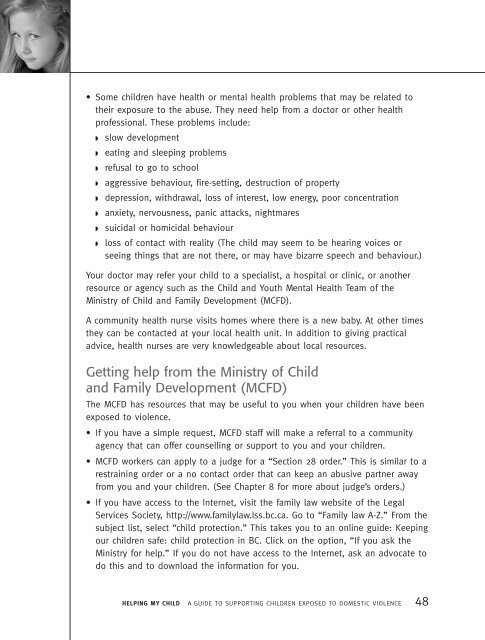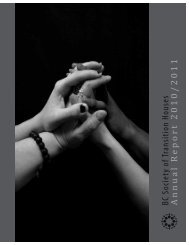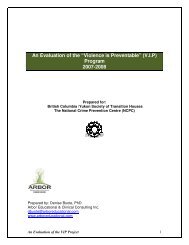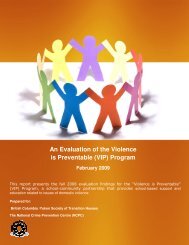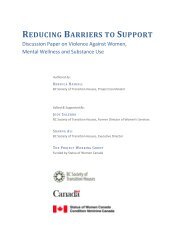a guide to supporting children exposed to domestic violence
a guide to supporting children exposed to domestic violence
a guide to supporting children exposed to domestic violence
Create successful ePaper yourself
Turn your PDF publications into a flip-book with our unique Google optimized e-Paper software.
• Some <strong>children</strong> have health or mental health problems that may be related <strong>to</strong><br />
their exposure <strong>to</strong> the abuse. They need help from a doc<strong>to</strong>r or other health<br />
professional. These problems include:<br />
◗<br />
◗<br />
◗<br />
◗<br />
◗<br />
◗<br />
◗<br />
◗<br />
slow development<br />
eating and sleeping problems<br />
refusal <strong>to</strong> go <strong>to</strong> school<br />
aggressive behaviour, fire-setting, destruction of property<br />
depression, withdrawal, loss of interest, low energy, poor concentration<br />
anxiety, nervousness, panic attacks, nightmares<br />
suicidal or homicidal behaviour<br />
loss of contact with reality (The child may seem <strong>to</strong> be hearing voices or<br />
seeing things that are not there, or may have bizarre speech and behaviour.)<br />
Your doc<strong>to</strong>r may refer your child <strong>to</strong> a specialist, a hospital or clinic, or another<br />
resource or agency such as the Child and Youth Mental Health Team of the<br />
Ministry of Child and Family Development (MCFD).<br />
A community health nurse visits homes where there is a new baby. At other times<br />
they can be contacted at your local health unit. In addition <strong>to</strong> giving practical<br />
advice, health nurses are very knowledgeable about local resources.<br />
Getting help from the Ministry of Child<br />
and Family Development (MCFD)<br />
The MCFD has resources that may be useful <strong>to</strong> you when your <strong>children</strong> have been<br />
<strong>exposed</strong> <strong>to</strong> <strong>violence</strong>.<br />
• If you have a simple request, MCFD staff will make a referral <strong>to</strong> a community<br />
agency that can offer counselling or support <strong>to</strong> you and your <strong>children</strong>.<br />
• MCFD workers can apply <strong>to</strong> a judge for a “Section 28 order.” This is similar <strong>to</strong> a<br />
restraining order or a no contact order that can keep an abusive partner away<br />
from you and your <strong>children</strong>. (See Chapter 8 for more about judge’s orders.)<br />
• If you have access <strong>to</strong> the Internet, visit the family law website of the Legal<br />
Services Society, http://www.familylaw.lss.bc.ca. Go <strong>to</strong> “Family law A-Z.” From the<br />
subject list, select “child protection.” This takes you <strong>to</strong> an online <strong>guide</strong>: Keeping<br />
our <strong>children</strong> safe: child protection in BC. Click on the option, “If you ask the<br />
Ministry for help.” If you do not have access <strong>to</strong> the Internet, ask an advocate <strong>to</strong><br />
do this and <strong>to</strong> download the information for you.<br />
HELPING MY CHILD A GUIDE TO SUPPORTING CHILDREN EXPOSED TO DOMESTIC VIOLENCE 48


